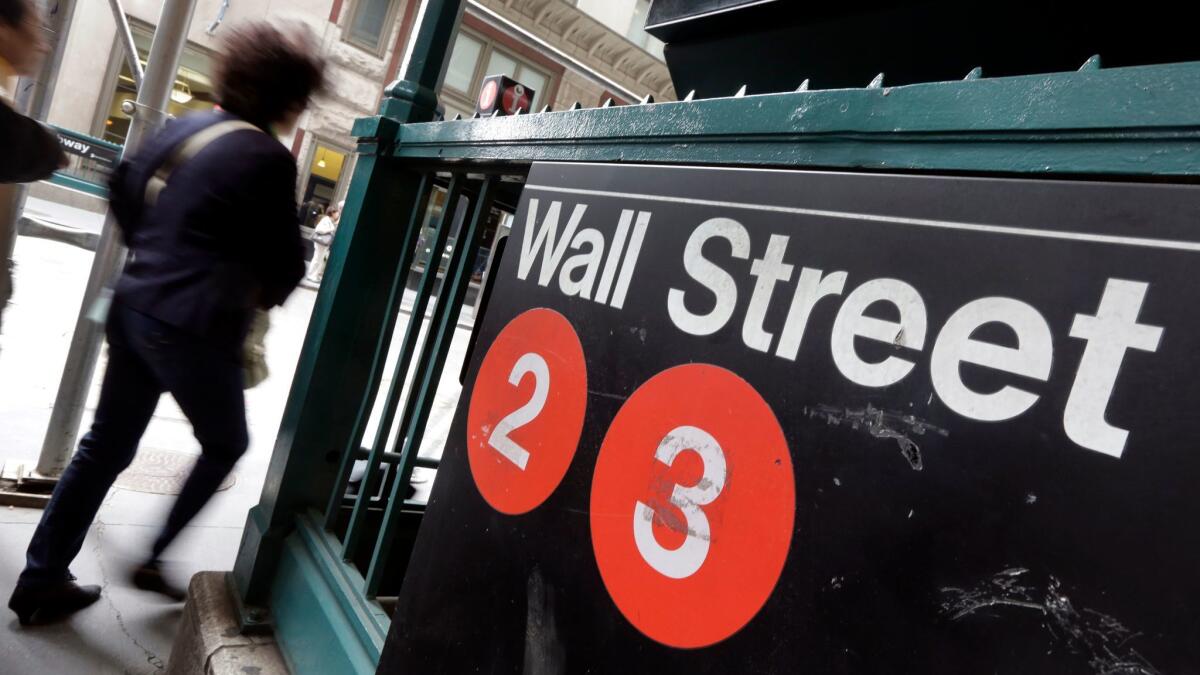Stocks end flat after wavering on Syria and jobs news

U.S. stocks never got going Friday after a slightly disappointing jobs report and word of U.S. missile strikes against Syria. Investors bought shares of defense contractors and stocks that are traditionally considered safe.
Stocks moved between gains and losses in the hours after the Labor Department said employers didnât add as many jobs as analysts had forecast. They started to rise later in the day, but those gains didnât last. Investors bought high-dividend stocks such as real estate investment trusts and household goods makers; banks and energy companies fell.
Scott Wren, senior global equity strategist at the Wells Fargo Investment Institute, said he was not surprised the stock market did not have an overwhelming reaction to the jobs report or missile strikes because neither really altered investorsâ views of the U.S. economy.
âIt was not a bad [jobs] report,â he said. âIt was just another in a long, long, long line of not bad, not great reports,â he said. Wren said the economy probably wonât grow much faster over the next few years because the Federal Reserve plans to keep raising interest rates, which makes borrowing more expensive.
Read more: Job growth slows, but unemployment falls to 4.5% as wages climb Âť
The Standard & Poorâs 500 index ended down 1.95 points, or 0.1%, at 2,355.54. The Dow Jones industrial average fell 6.85 points to 20,656.10. The Nasdaq composite slipped 1.14 points to 5,877.71. The Russell 2000 index of small-company stocks inched up 0.14 of a point to 1,364.56.
Although stocks didnât move much overall, there were a few clear trends. Investors mostly avoided industries whose performance is closely linked to the state of the economy.
The government said employers added 98,000 jobs in March, which was weaker than the last few months and about half as many as analysts had predicted. One-time factors including snowstorms may have temporarily slowed hiring. The unemployment rate fell to 4.5%, its lowest level since 2007, as more people found work.
Over the last three months hiring has remained around the same monthly pace as in 2016.
Overnight, the U.S. launched a missile attack on a Syrian air force base after a chemical weapons strike earlier in the week that was blamed on the government of Syrian President Bashar Assad. Russia and Iran condemned the U.S. move.
The VIX, known as Wall Streetâs âfear gauge,â started rising late Thursday as the U.S. government shifted its policy on Syria.
Early on Friday, gold jumped to its highest price since right after Novemberâs presidential election, and bond prices climbed. But that didnât last long, and bond prices turned lower late in the day. The yield on the 10-year Treasury note rose to 2.38% from 2.34%.
The increased geopolitical uncertainty pushed up defense stocks. Raytheon rose 1.5% to $152.96 and Lockheed Martin rose 1.2% to $270.23.
Among high-dividend stocks, Wal-Mart climbed 2.1% to $72.90 and Prologis rose 1% to $53.58.
The military strikes in the Middle East lifted crude oil prices. U.S. oil rose 54 cents, or 1%, to $52.24 a barrel in New York. Brent crude, the standard for international oil prices, rose 35 cents to $55.24 a barrel in London.
21st Century Fox declined for the fifth day in a row as advertisers continued to pull their ads from âThe OâReilly Factor.â Less than a week ago, the New York Times reported that Fox News and Bill OâReilly, the networkâs most popular prime-time host, have paid $13 million to five women to settle allegations of sexual and other misconduct. Kantar Media says the show brought in more than $100 million in advertising revenue in 2016. The stock slipped 5 cents to $31.07 on Friday; itâs down 4.1% this week.
Wells Fargo slipped 1% to $54.84 after an influential firm that advises big shareholders says most of its board of directors should be removed. Institutional Shareholder Services said the board isnât doing enough to oversee the bankâs sales practices. A second firm also recommended that a large portion of the board be replaced at this monthâs Wells Fargo shareholder meeting.
Gold finished up $4 at $1,257.30. Silver fell 10 cents to $18.15 an ounce. Copper fell 1 cent to $2.65 a pound.
Wholesale gasoline rose 2 cents to $1.75 a gallon. Heating oil rose 2 cents to $1.63 a gallon. Natural gas slid 7 cents, or 2.1%, to $3.26 per 1,000 cubic feet.
The dollar fell to 111.15 yen from 110.78 yen. The euro fell to $1.0588 from $1.0646.
Britainâs FTSE 100 index was up 0.6% and the French CAC 40 rose 0.3%. Germanyâs DAX hardly budged. Japanâs benchmark Nikkei 225 index rose 0.4%. The Kospi of South Korea lost 0.1% and Hong Kongâs Hang Seng was little changed.
UPDATES:
2:35 p.m.: This article has been updated with closing prices, context and analyst comment.
1:25 p.m.: This article has been updated with the close of markets.
9:05 a.m.: This article has been updated with more recent market information.
This article was originally published at 7 a.m.
More to Read
Inside the business of entertainment
The Wide Shot brings you news, analysis and insights on everything from streaming wars to production â and what it all means for the future.
You may occasionally receive promotional content from the Los Angeles Times.










